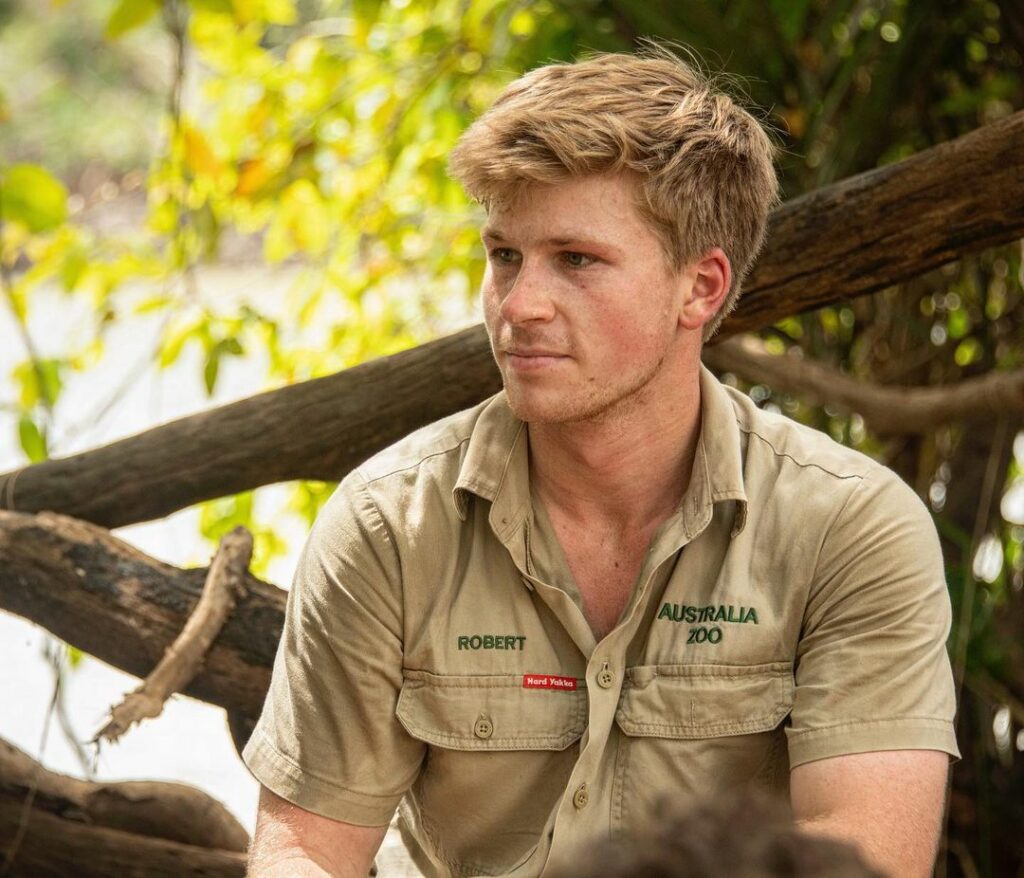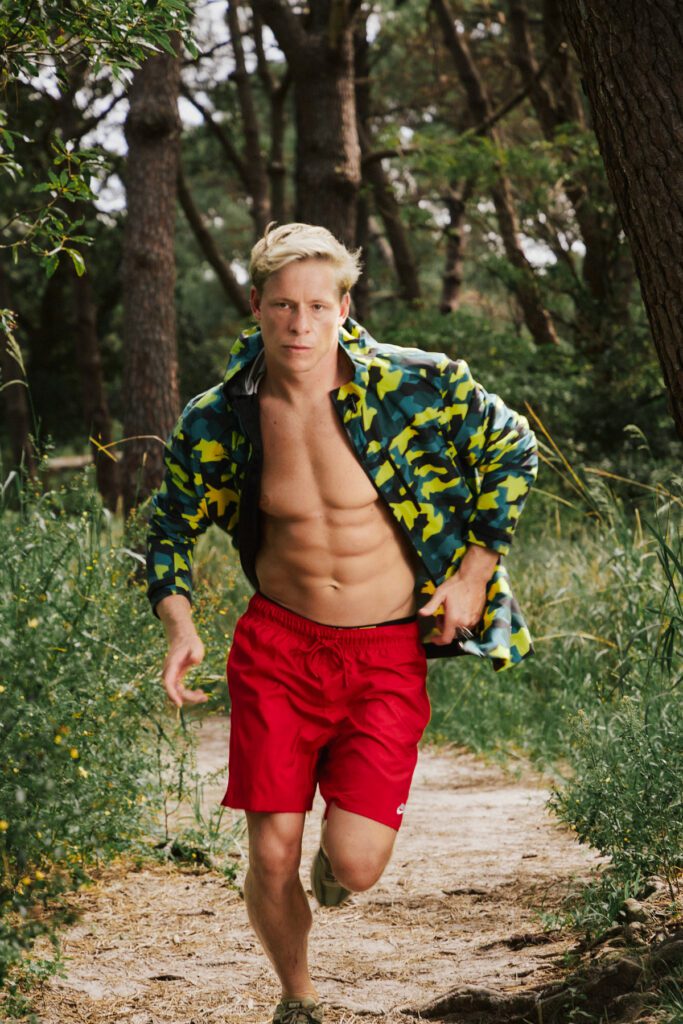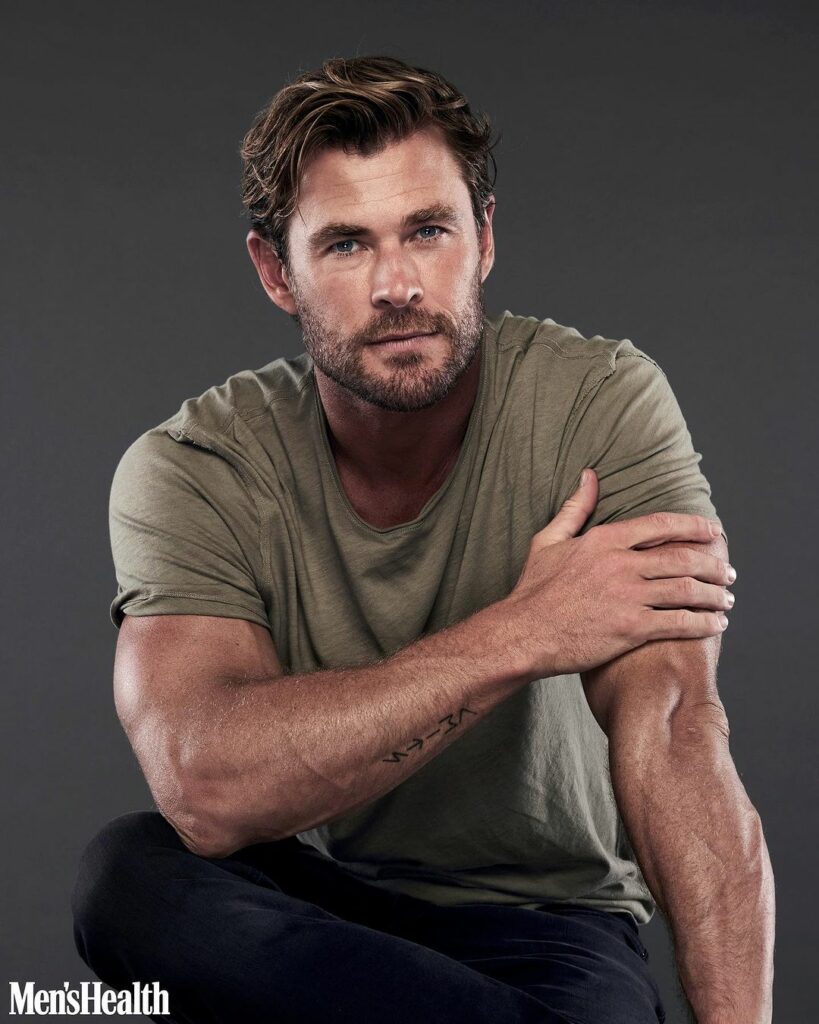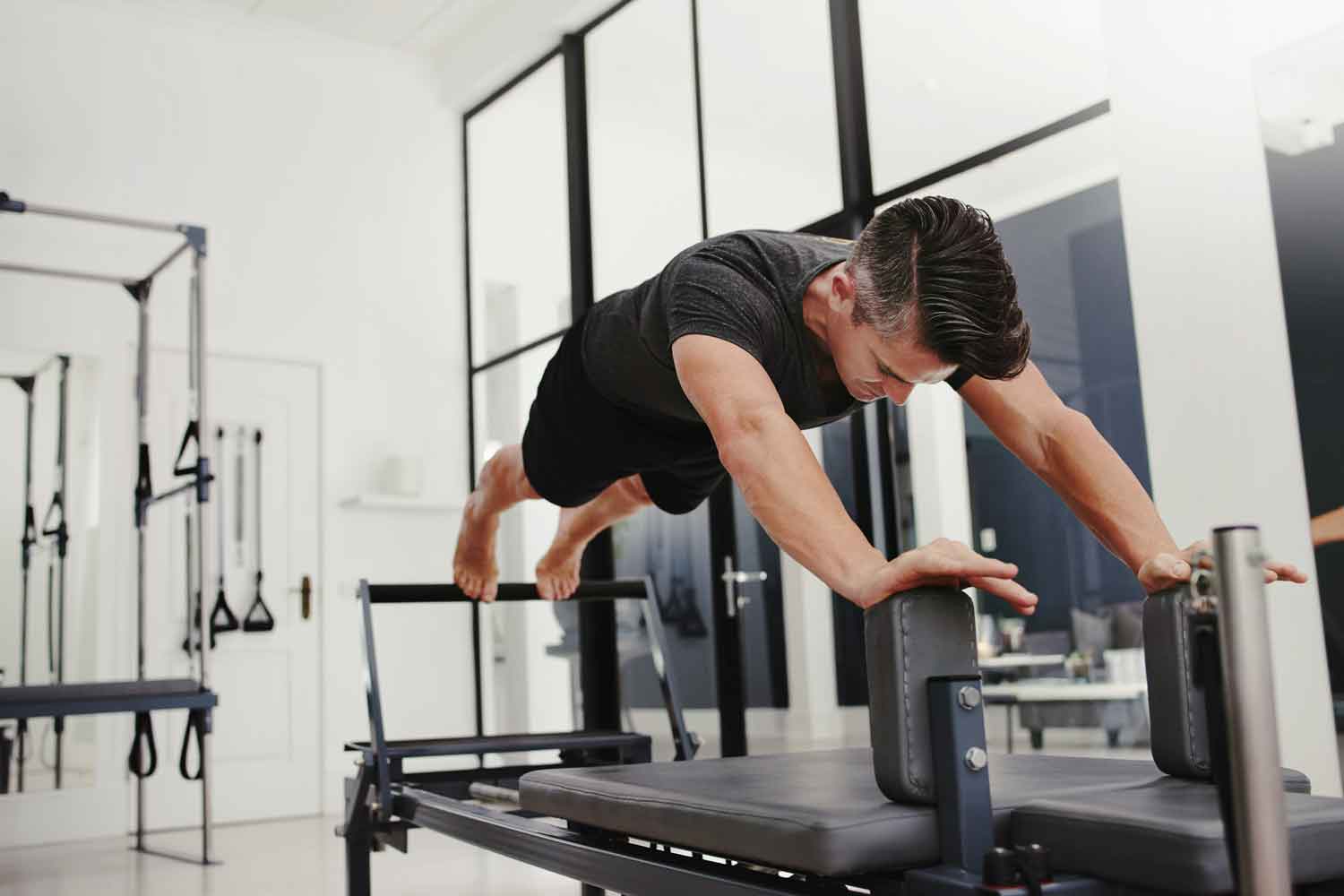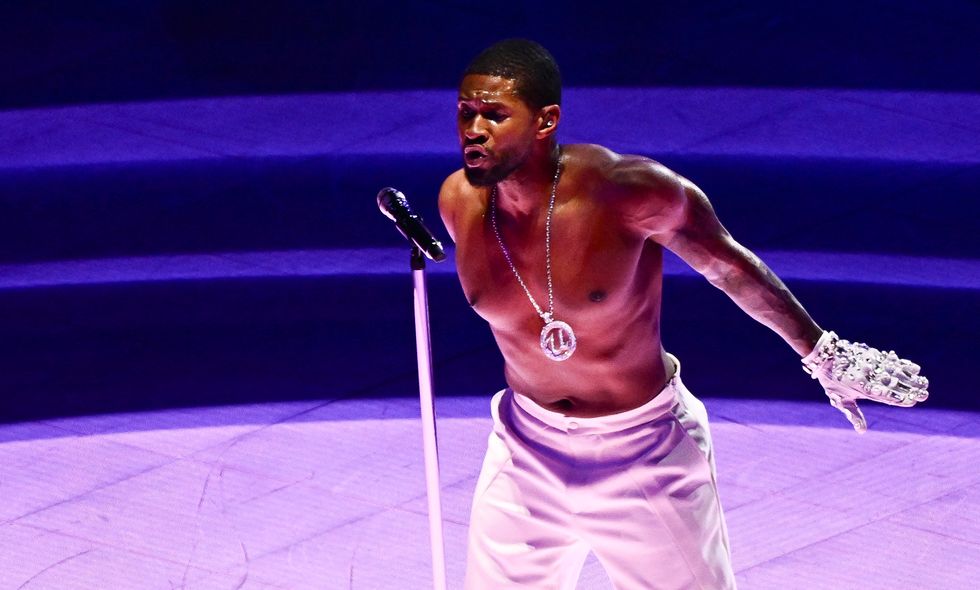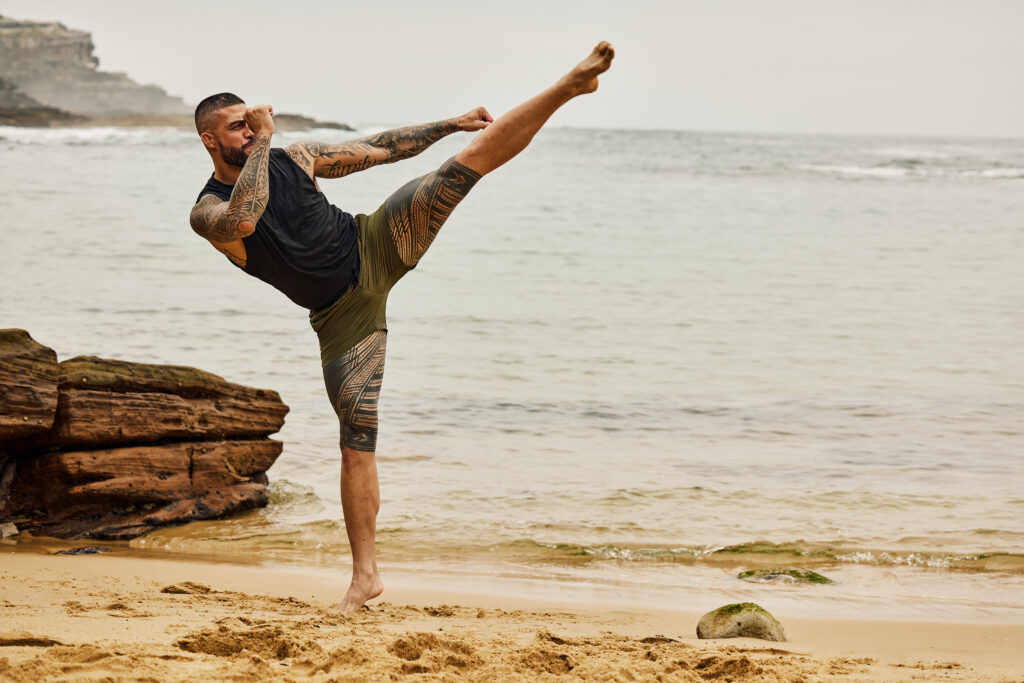The English language is a strange beast. Take the phrase ‘a force of nature’, often used to describe someone or something that is irrepressible, unstoppable, often unforgettable. It’s used to liken a person to characteristics of nature exhibited in her most volatile state, quite often one provoked by human interference.
Of course, nature can also be calming, complex, nurturing, supportive and energising, a blessing. Australian actor Sam Corlett, then, is a force of nature in all senses.
Certainly, he seems to have brought the weather with him today. As we gather to shoot the 26-year-old on a remote stretch of beach near Broken Head in Northern NSW, we’re witness to the opening act of an extreme weather event that will lead to catastrophic flooding in the region.
If Corlett’s feeling the pressure of shooting his first major magazine cover, the impending release of his big-budget Netflix series Vikings: Valhalla and mounting expectations as Australia’s next Hollywood heavyweight,,he doesn’t let it show. In fact, as the wind and rain whip around him, he’s calm, almost ethereal, before his youthful energy bursts free. A backflip off the sand dunes precedes a quick dip in the ocean between shots. Next minute he’s up a tree, or juggling rocks on the ground – continually interacting with his environment. It’s as close to the fabled ‘flow state’ as I can imagine.
Softly spoken and considered, Corlett lacks the false bravado some of his more seasoned contemporaries often deploy in the spotlight. “Sometimes the challenge for me is to be light and fluffy and humourous,” he says. Perhaps he doesn’t need to be. Corlett knows who he is and what he’s capable of. The world is about to find out, too.
By the time we meet in person for three days of interviews, photoshoots, spiritual consultations and vegan meals, I’ve been in touch with Corlett for two months, planning this cover. From the moment we were introduced by mutual friends, he wanted to be involved in the creative process. What followed was weeks of shared workouts, poetry and visions for this issue.
Although Corlett’s career is just getting started, his creativity is abundant, the excitement evident behind his sparkling blue eyes. Very much the modern renaissance man, the actor is fierce enough to portray bloodthirsty warriors on screen,yet sufficiently emotionally available to share his views on, say, history’s great poets during fireside chats with mates.
Corlett’s arrival in Hollywood heralds a new breed of male superstar, one able to remain grounded while navigating the soaring peaks and precipitous troughs of viral fame. His untamed locks and piercing eyes don’t hurt his cause, but much like others in this new vanguard of Aussie leading men – Stranger Thing’s Dacre Montgomery and Euphoria’s Jacob Elordi – he’s a man of substance as well as style. An artist to his core.
In a world in which public figures build careers upon notoriety and chaos, it’s reassuring to know that with men like Corlett leading the way, the future of the Aussie entertainment industry is in safe hands.
Almost immediately after we meet I remark on his maturity, wishing I might possess a fraction of his wisdom when I’m twice his age. “I don’t want to sound like a wanker,” says Corlett when I point this out, “but I’ve been called an old soul a fair few times. A different way of looking at that is, how much time have you spent with your soul?”
‘Old soul’. It’s another idiosyncratic, deliberately ironic turn of phrase to ponder, as Corlett turns away from me to execute another childish backflip.
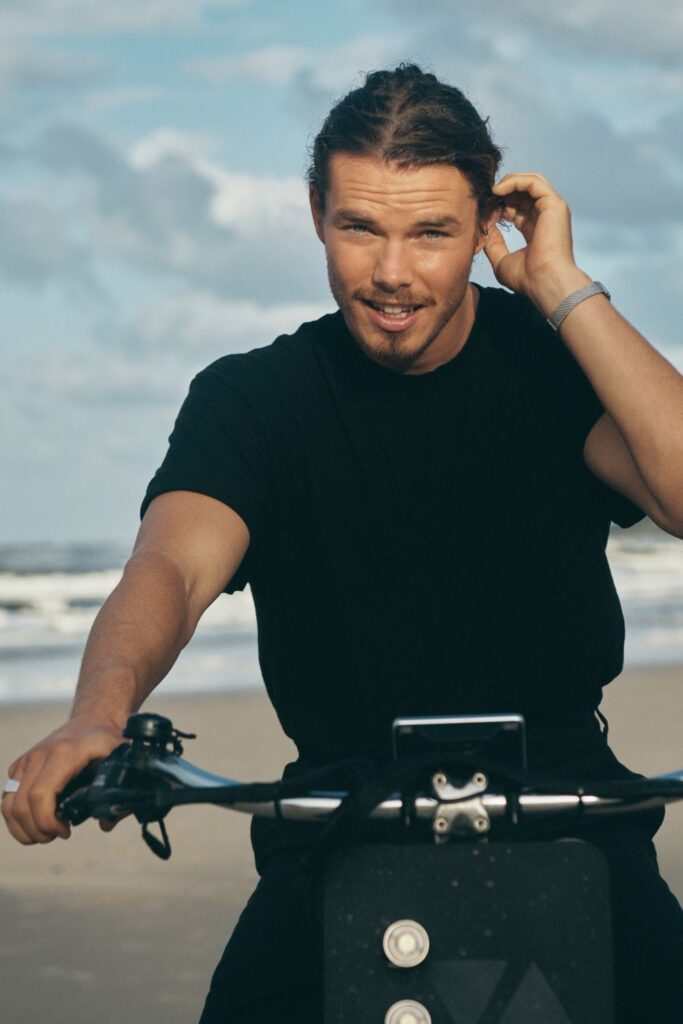
Rising Tide
For Australia’s next big Hollywood export, Corlett’s ascent has been decidedly non-Hollywood. For starters, he is yet to star in a blockbuster, instead carving an enviable reputation through Australian cinema and big-budget Netflix series.
Corlett is currently finding acclaim thanks to his starring role in Netflix’s Vikings: Vallhalla. Released in February, the series – a sequel set 100 years after the original History Channel Vikings series – Valhalla is trending on top of Netflix’s global content library worldwide. Corlett gets top billing as Leif Erikson, a character based on a Viking
leader believed to be one of the first Europeans to set foot in North America.
It’s quite a start for any actor. And yet Corlett’s tale isn’t that of the precocious teen determined to make it big. Rather, it’s of a boy with a passion for both poetry and sport who struggled with crippling social anxiety.
A talented high-school athlete, in Year 10 Corlett found himself captaining both the rugby and basketball teams. The roles came with the responsibility to report on the teams’ achievements at school assembly on Monday mornings. It was during these speeches that Corlett’s nerves started to get the better of him.
On his mum’s suggestion, Corlett took up drama, hoping to channel his anxiety into something a little more useful.
“I already had a love of psychology and Shakespeare and had travelled and seen different perspectives and a different physicality of things,” he says. “It was an amalgamation of everything that I was interested in and everything that excited me. My interest [in drama] became a passion and then an obsession.”
The drama classes did wonders for Corlett’s self-esteem and confidence. Bringing characters to life opened a door to vulnerability, which he allowed to transfer to his off-stage life.
After toying with the idea of tertiary studies in journalism and psychology, Corlett opted to follow his new obsession, gaining entry into the esteemed Western Australian Academy of Performing Arts (WAAPA). Corlett spent three formative years studying his craft before landing his first gig alongside none other than Eric Bana. The role was in the big screen adaptation of Jane Harper’s The Dry.
Corlett played a young Luke Handler in the Robert Connolly-directed murder mystery. As I watch Corlett in front of the camera here in Broken Head, I can’t help but wonder how much of himself he brought to the role. His interaction with the environment today is reminiscent of Handler’s foraging in the local river bed and general delight in enjoying the rugged mystery of the Aussie bush.
The shoot went for six weeks and by the end of filming Corlett had well and truly caught the acting bug. A good
thing because doors were beginning to open. “I dived deeper into every audition that came my way,” he says. “I had so much fun because every two days there was a new role, a new script, a new thing to dive into and I had so much fun exploring. It’s like jumping from world to world and just planting seeds and if anything came to fruition, great. If I wasn’t right for the role, great. I just trusted the process.”
It was during this period that Corlett received the script for Chilling Adventures Of Sabrina, the modern reboot of the Sabrina comic book series. Corlett auditioned for the role of Caliban, the Prince of Hell and describes the ensuing process as a whirlwind.
“I auditioned for Sabrina on the Tuesday, got notes from the showrunner on a Wednesday and they asked ‘Can you be in Vancouver on Friday?’ And so Thursday night, I was doing all the visa applications and then I hopped on a flight Friday morning, arrived Friday morning in Vancouver, dropped my bags off at the hotel and then went straight to the first table read.”
Corlett was a hit with the Sabrina crew and what was meant to be a four- episode story arc became 16. While grateful for the opportunity, Corlett admits he found himself yearning for more challenging work, a part in which he could really flex his dramatic muscles. Valhalla fit the bill.
“I used to watch the original show with my dad growing up and so I knew that he’d be stoked if I ended up doing this,” he says. “It was one of those shows we all have with our families. If one person gets ahead, everyone else gets angry and we had that with Vikings.”
Corlett is clearly thrilled at the prospect that his new vehicle may become that show for families around the world, though the scale of Netflix’s reach continues to blow his mind. “I sat down at a Netflix meeting and they just said, ‘At a press of this button, it’s going to 222 million people around the world’. I still can’t grasp that idea.”
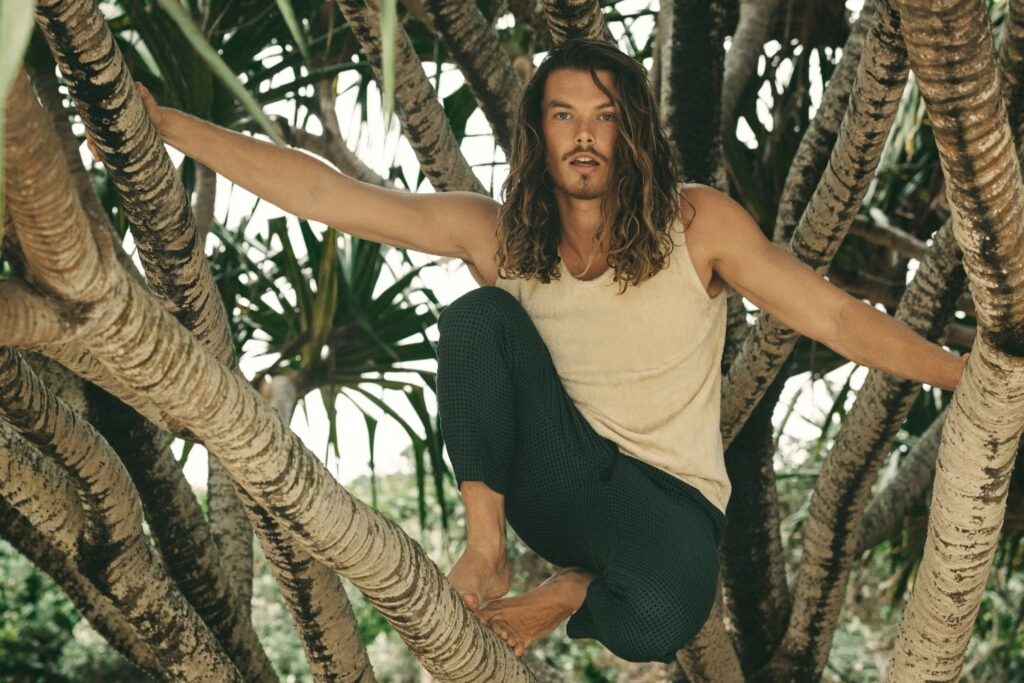
Family Tree
A passing shower forces us under a beachside tree. We can’t shoot while it’s raining in case the camera equipment gets wet, so the crew has scurried off to the safety of a Tesla, leaving Corlett and I marooned under our natural shelter. For the first time I notice a tattoo on his ankle. He then shows me a signet ring he’s wearing bearing the same pattern – three lines symbolising his mother’s three triumphs over cancer that he designed himself.
Acting may be Corlett’s obsession but his family is everything. He credits his success and his mature approach to the industry to the values instilled in him by his parents. He’s also found lessons in the challenges that have befallen the clan.
“From quite an early age, due to unfortunate circumstances, like my uncle passing away quite young, my mum going through three bouts of cancer, not having met my grandad on my mum’s side because of alcohol and just how much my mum tried to provide me with such a safe upbringing and open up my world, I just knew how good of a hand I’d been dealt.”
It’s perhaps due to these experiences that Corlett was able to recognise the pitfalls of fame, even before fame itself found him and why he’s been able to avoid the demons all too common in his line of work thus far.
“There are a few different experiences in my life where death was at our doorstep and that shed a lot of shit that could have impacted me but didn’t,” he says. “I think thinking about death makes us so grateful for life and I actually try to think about it often because it just makes me so much more awake and grateful to be here.”
There’s a moment, however, where his positivity gives way to vulnerability. Corlett turns sombre, before elaborating on the loss of his uncle.
“I just really wanted to appreciate that and honour my uncle through my art because he was also an artist and musician and poet and had a lot going for him but unfortunately, alcohol kept pulling him away,” he says. “He’s with me in every creative aspect I have.”
I return the favour, sharing that I too lost an uncle prematurely. It seems to provide comfort, reminding us both of lessons that can be found in profound loss.
“I feel like the best way to honour the people that have accidentally strayed off the path is to attempt to use their way of being as a lesson and honour them by being as grateful for the gifts that you have as possible,” he says.
Tough times have not only instilled a sense of gratitude in Corlett, they proved to be the catalyst for his interest in meditation and spiritual healing. He tells me of Reiki healers and meditation teachers visiting his house during his teenage years, working with his mum during her battles with breast cancer. It was his mother’s openness to Eastern practices that influenced the direction her son’s life would take.
The spiritual connection he formed during those formative years saw him devise a dedicated morning routine centred around introspection. He’s a devout yogi (“to appreciate the vessel I have”), meditates every morning (“getting in touch with breath and body”) and journals almost daily, writing pure stream of consciousness. I ask him what this achieves. Is it confidence? Acceptance? Peace?
“The intention is that you’re going to burn it at the end of the day, so you can be so free and liberated in the way
you articulate yourself,” he says. “It’s definitely a practice that I would encourage more people to do. It started very much as self-inquiry and I’d almost speak to my higher self. I’d converse with myself and relay an issue that was going on and then tell myself what I could learn from it. So immediately, I was looking for the benefit or the opportunity that was to be gained from certain situations. I used to write down what scares me. Then I’d write about it and try to identify all the different areas in myself that needed to be free of it. That way I can use it to serve a purpose.”
Further rain delays and ensuing stolen moments of reflection mean we’re on the beach shooting as long as the light and weather will let us.
And it’s when we’re getting the final photo of the day – Corlett on his electric bike, driving directly towards the camera before veering off course at the final moment to avoid impact – that it happens. The soft sand catches the front tyre, sending Corlett flying. He slices open his shin and potentially fractures his wrist. There’s a moment of panic for all involved. Have we broken Sam Corlett?
Corlett dusts himself off and heads into the surf without a word, emerging refreshed and ready for more. I ask him if it’s the salt water that’s healed him? It’s a distraction, he insists, a return to a childlike state. He’s fallen off a bike, an accident reminiscent of childhood days spent mucking around, and the fix is equally childlike. His jaunt in the ocean was simply a pleasurable diversion from the pain.
“We all remember a moment as a kid, playing in the grass or in the sand or in the ocean, just being in such awe of the world around us and I think that’s our natural way.”
Actively embracing the wonder and dreams of childhood is a practice he developed while unwinding after long, physical days on set. “Each night during Vikings, I wrote a reminder to myself saying that by doing nothing but being who you are, you’ll achieve everything you’re meant to. Then I’d colour it in with crayons, just to make it look the way a child would. It felt really nice to tap into that childlike nature.”
It’s these micro-regressions to a childlike state that keep Corlett balanced, as well as his more prolonged bouts of meditation. And it’s something he’d love to see more of in his fellow man.
“I’d love to make the spiritual casual and the casual spiritual. Yeah.”
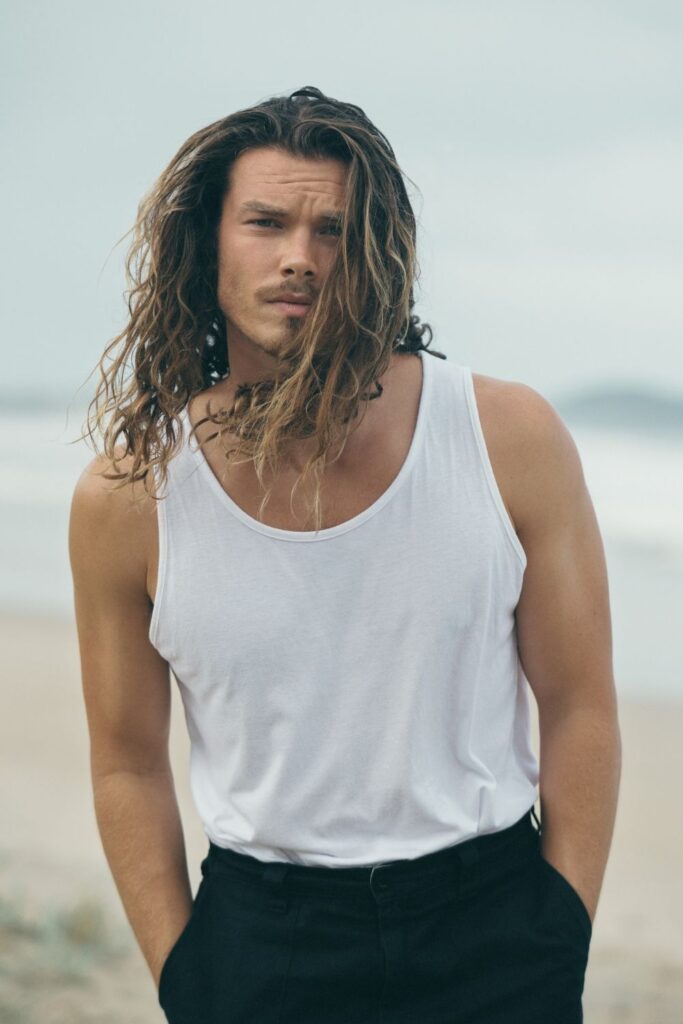
Nordic Curls
While Valhalla is proving to be a career-defining role for Corlett, much like Leif Erikson, his Scandinavian alter-ego, shooting wasn’t all smooth sailing. Jetting out from Australia to Ireland to film the first two seasons in May last year, Corlett switched on his phone during a layover in Dubai, intending to send a simple “I miss you” text to his family. Instead he was bombarded by 14 emails and nine missed calls from his agent, alerting him that production had been postponed for two months. It was there in the terminal that Corlett was faced with a decision: continue on to Ireland for eight weeks or return home, complete two weeks of hotel quarantine and fly out again when shooting commenced. It was a tough decision for the outdoors lover, who had already done over two months’ worth of combined quarantine over the course of the pandemic.
Corlett decided to return to Australia, facing down another two weeks of self- isolation. If nothing else, it was a good opportunity to hone his spiritual practices.
“I had my yoga mat, so it was weeks of yoga, meditation and doing a lot of bodyweight stuff. I even did a distant Reiki session.”
When Corlett did finally arrive in Ireland, he threw himself into the role of Erikson. From the minute he woke up, he would live and train like a modern Viking.
“Waking up, I’d be brushing my teeth with my left hand to open new pathways in the brain, then I started squatting, getting my body ready,” he says. “And then I did a little yoga flow, it’s only five, 10 minutes and then I’d meditate for 15 to 20 minutes. After that I would go for a run for half an hour to 40 minutes.”
Following his run, Corlett would bathe in the freezing ocean, forgoing a warm shower, before heading to set. It was a basic, bare-bones routine, but necessary for the role, says Corlett. After all, the Vikings didn’t exactly have access to treadmills, Smith machines or AssaultBikes.
“The kind of headspace I wanted to be in was very primal,” he says. “So getting amongst the elements in the morning, getting in touch with the body and jumping into the ocean, all of these helped forge a primal mentality. And so when I ended up on set, I felt like I’d entered that space.”
Corlett worked remotely with Australian-based trainer Jaden Garft in preparation to become Erikson. His afternoon routine consisted of lifting, still with an emphasis on functionality and primal movement patterns. “I was fortunate enough to be given a barbell and some weights and then I bought a couple of kettlebells, so it was a lot of very compound movements, volume based. A lot of grip work with farmer’s carries, some CrossFit movements and then Jaden was feeding me a lot of new patterns to work on with kettlebell flows.”
Since returning to Australia, and in preparation for his return to set in May, Corlett has enlisted none other than the fittest man alive, Ross Edgley, to assist with his training. The pair quickly forged a friendship based on a shared openness to spiritual philosophies . . . and bench presses. Edgley often refers to himself as a “philosopher of fitness”, so it makes sense that Corlett, a deep thinker on all facets of life, would gel with the Englishman.
“Ross is just such a wealth of knowledge and one of the kindest men I’ve ever come across ,” he says. “I can’t express my gratitude to him enough. He’s just got such a clear and precise way of educating.” The positivity instilled by Edgley has sparked the biggest change in Corlett’s approach to fitness.
“What I most admire about him is that you have people out there who are doing what he’s doing and saying, ‘It’s hard work, you have to fucking push. You have to beat the bitch inside of you’, which is not the way for me. Whereas for him, he’s just shrugging and saying, ‘I don’t know, something’s just pulling me to do it. I’ve just got to do it’, and he’s enjoying it.”
It’s a classic Edgley philosophy, the ‘Science of the Smile’, which suggests that even forced positivity can help you conquer the mightiest of feats. On that point, I can see Edgley’s education on show at the end of the day, as Corlett limps up the beach towards the car park, forcing a smile.
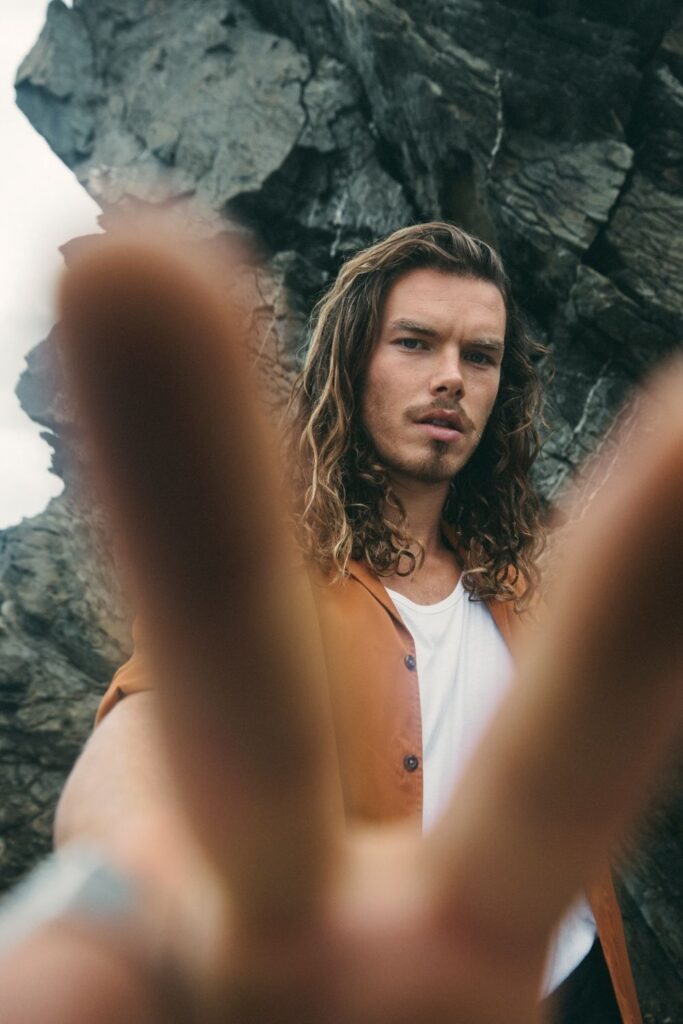
Happy Meal
That night, Corlett holds court over dinner, carrying battle wounds from a hard day’s work. He delights in showing off his ailments, the cuts on his shin resembling gills, so perfectly spaced they could be a tattoo. The irony that even Corlett’s injuries are distinctly artistic isn’t lost on his friends here tonight.
It’s one of Corlett’s last nights in Australia for a few months so a tight-knit group of mates, some of Byron’s more prominent residents and Corlett’s family, have assembled for a vegan dinner to send him off. Corlett has been vegan for four years, initially for environmental reasons, but he’s since felt his energy
levels “increase tenfold”. He admits over dinner that he was hesitant at first, mainly because of the stereotypes associated with plant-based living.
“I always admired vegans and vegetarians growing up but the people that were vegans and vegetarians were the families that wore mountain-climbing boots to the shops and had their rash vests slathered in sunscreen. I was like, ‘Fuck, do I have to be like that in order to be vegan and vegetarian?’” As he travelled and met more vegans, however, he quickly realised footwear had little to do with dietary habits or anything else for that matter. Most of Corlett’s mates hardly ever wear shoes.
Before long the conversation, as it often does in this part of the world, turns to environmentalism. “I think it’s a natural way to love the world,” Corlett says. “We are natural entities. If you look around yourself right now, there’s not one thing that didn’t originate from the Earth. Whether it be so-called man-made or not, its material is made up from organic matter.”
Earth, nature and protection of the environment are critically important to Corlett, so it makes sense that he’s bonded so quickly with those around the table who share his passion. The concern in Corlett’s eyes is clear as he talks about the challenges the planet faces. It’s classic climate anxiety.
“We’ve heard this a lot but it’s so time for a system change,” he says. “We need to start employing the practices of our Indigenous people who’ve lived off the land for ages. They respect the land, which is giving them life.”
It’s an intense conversation and it’s difficult not to feel overwhelmed. The problems we face are evident, but how can real change – the change necessary to save the planet – start? Corlett has a few ideas.
“We know what’s going on and for myself, the practices that I employ are purchasing as much regenerative or sustainable clothing as possible, upcycling, recycling, vintage, all that stuff,” he says. “Access to sustainable practices will come when the demand’s there, that’s just the way business works and I think if we simply don’t support brands that continuously fuck the environment and support those that aren’t, the whole world’s going to change.”
As for himself, he’s aware of the power he holds to help drive change.
“My circle of influence is growing and I just want to remain as grounded as I can, as I become more in the public eye,” he says. “I’ll continue to be an example of how you can live in a way in which you do your best to heal the planet.”
With that, he bids us goodnight as he turns in early to treat what needs healing now: his wounds.
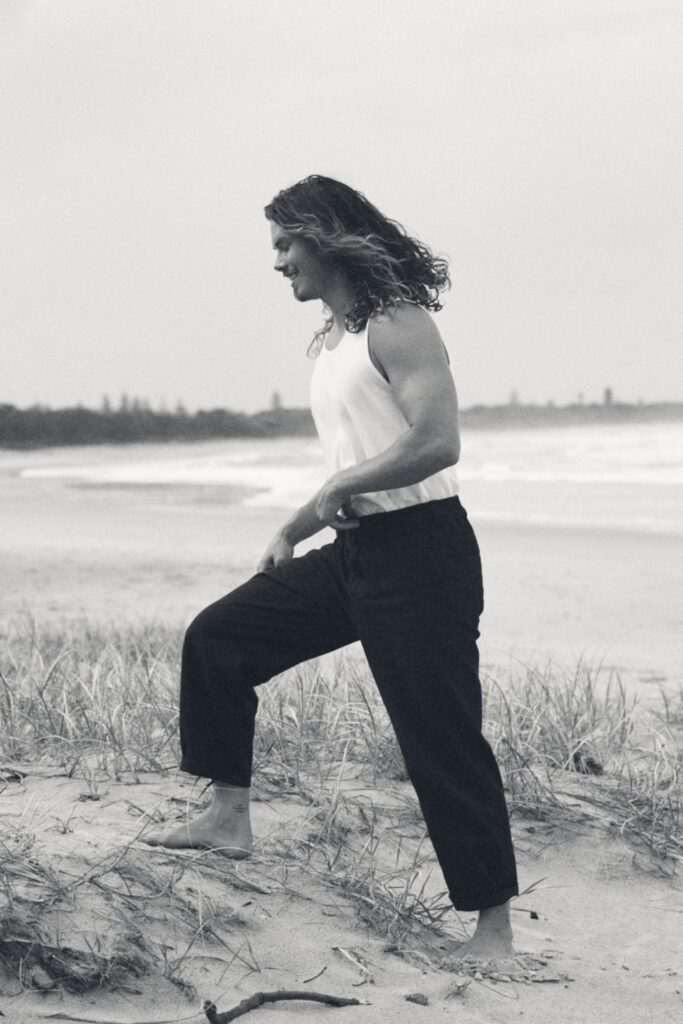
Captain Corlett
“I’m just going to riff, is that okay?” says a fresh-faced Corlett as we settle into a corner table at his favourite café.
It’s the morning following the cover shoot, and we’ve caught up over one last herbal tea before he’s due to jet out to LA the following day. Or maybe he’ll go in two days . . . he’s hasn’t booked yet and he’s more than happy to ‘riff’.
The sun is making a rare appearance after two weeks of near-torrential rain and the town is coming back to life. It’s a huge sacrifice for Corlett to forego a surf, perhaps even another electric bike ride along the beach, to chat, though he really does need to get his wrist checked out, he says.
The latest trailer for Valhalla has dropped only minutes before we sit down for breakfast, and he stops mid-interview to show me, offering his headphones and leaving the table so I can watch it without distraction.
“My sister and my mum cried watching that trailer,” he says before stepping away, almost daring me to shed a tear. It’s emotive as hell, I’ll give him that, but not as powerful as seeing Corlett’s pride and excitement.
Afterwards, we talk about what his future might hold. It’s daunting to figure out what your next move will be when you’re on top of the world and your options are endless.
“[Writing and directing] feels like the next step for me, but I prefer to be patient and wait for the right opportunities, rather than be in a hurry to move.” He tells me that he wants to focus on projects he wants to watch, those that elevate the consciousness of humanity, that seek both to entertain and educate. He wants only to add to the world, not create noise in a vacuum.
And despite global ambitions, he remains connected to Australia and its people. Don’t be surprised if you see Corlett in more Aussie productions, particularly sharing stories of our Indigenous peoples.
“I’d love to connect more to Australia,” he says. “I feel like there’s a lot about our country that we are unaware of. A lot about our Indigenous people that we’re unaware of. I’d love to visit Arnhem Land and really awaken myself to their connection with our land and deepen my love for the land. There’s so much to celebrate and so much to learn.”
Outside of his nine-to-five, Corlett ponders his options, particularly in the world he’s about to re-enter after months of relative anonymity in Byron Bay. He’s writing a poetry book, he continues to draw and there is, of course, the third season of Valhalla to film. Yet, somewhat prophetically, he outlines his broader ambitions when it comes to his role in a world seemingly on the brink of something dire.
“I really admire Sean Penn and the work that he does,” muses Corlett on the type of man he’d like to be (this was mere weeks before Penn flew to Ukraine to document the ongoing invasion). “[Sean] started a community organised relief effort in Haiti which he’s now brought to the States when the New Orleans floods happened. He decided to hop on a plane, go there, jump on a boat, literally pull people out. I really admire people that walk the walk, rather than just talk the talk.”
Weeks later, Corlett would prove himself to be such a man, finding himself fundraising for victims of the floods on the very land on which we sit. Right now, though, he’s intent on captialising on the opportunities Valhalla has given him. It’s all a journey of self-discovery and Corlett is savouring the ride.
“The more you get in tune with who you are and be that person fearlessly, the more support you’ll get from those around you and people will be attracted to you that are of a similar mindset – it’s just like fans to the flame.”
Fanning the flame? Sounds like some real ‘force of nature’ shit to me.
Story by Scott Henderson
Photography by Jamie Green
Styling by Tessa Law










